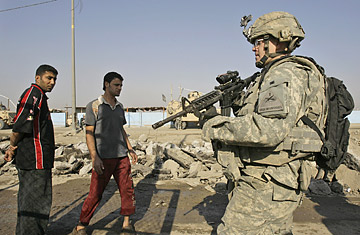
A U.S. soldier secures the area at the scene where a roadside bomb exploded in Sadr City, Baghdad.
Senior U.S. military officials will likely advise Barack Obama to adjust his campaign pledge to withdraw all U.S. combat troops from Iraq by mid-2010. While promising a 16-month timetable for getting all U.S. fighting forces out, Obama repeatedly insisted on what he calls a "responsible" withdrawal. Pulling nearly all U.S. troops and equipment out of Iraq in 16 months is "physically impossible," says a top officer involved in briefing the President-elect on U.S. operations in Iraq. That schedule would create a bottleneck of equipment and troops in the south of Iraq and Kuwait where brigades repair, clean and load vehicles and weapons for the trip home, said the official. Others say the U.S. could conceivably pull out on that time scale, although that would require leaving more equipment behind. A more important concern for officers is that the security gains in Iraq would be put at risk if troops were withdrawn before the Iraqi security forces are in a position to protect their own communities and borders. (See pictures of U.S. troops' 5 years in Iraq.)
Already, the drawdown of troops is accelerating. The Pentagon announced Wednesday that a brigade of the 101st Airborne division will rotate out of Iraq before Christmas, as much as two months ahead of schedule, bringing the total number of combat brigades in Iraq down to 14 from its late 2007 peak of 20. But there is a limit to how quickly U.S. soldiers can depart the country while maintaining the current level of security. Although security has improved dramatically in many neighborhoods in Baghdad over the past year, the ability of the Iraqi security forces to act independently and effectively, while improved, remains inconsistent. Iraqi forces have yet to shift their focus from counterinsurgency operations to defending Iraq's borders. The Iraqi air force, for example, announced this week that it has ordered French- and American-made fighters, but its planned 32 squadrons won't be fully up and flying until 2015. The former insurgents who joined the "Awakening" movement or neighborhood watch programs are being partially integrated into the Iraqi security forces, but this remains a point of tension amid continuing mutual mistrust between these Sunni groups and the Shi'ite-dominated government. Al-Qaeda in Iraq, meanwhile, continues to find sanctuary in and around the northern city of Mosul.
In an interview with TIME, Commander of U.S. forces in Iraq, General Raymond Odierno said the numbers of U.S. troops can and will go down. "We don't have to do it with 150,000; we can do it with less," Odierno told TIME, without specifically addressing Obama's campaign pledge. But the drawdown will have to be done "slowly, in a deliberate way, so we don't give back the gains we've had."
The Iraqi government, for its part, has asked that all U.S. troops be pulled out of Iraqi cities by June 2009 and out of Iraq by 2012. That remains part of the Status of Forces draft agreement currently being renegotiated between Washington and Baghdad, to create a legal framework for the operation of U.S. troops in Iraq when their current mandate expires on January 1. Iraq's foreign minister, Hoshiyar Zebari, says he is confident that the Obama administration will not pull U.S. troops out of Iraq too quickly. Obama has agreed to "consult with the Iraqi government and the U.S. military in the field," Zebari told BBC television on Wednesday. And Obama himself has indicated that he's willing to revisit his 16-month withdrawal schedule. He acknowledged over the summer that it may be necessary to "slow the pace because of the safety of American troops," he said. "I would be a poor commander-in-chief if I didn't take facts on the ground into account." (See pictures of life inside a Baghdad prison.)
Obama received his first on-the-ground briefing in Iraq on the morning of July 21 at a military base adjacent to the Basra airport. During the briefing, said a senior U.S. military official, then-Senator Obama seemed "receptive" and "asked good questions." The hope among senior officers in Iraq is that President-elect Obama will make good on another promise he's made over an over again from the stump: "We must be as careful getting out of Iraq as we were careless getting in."
